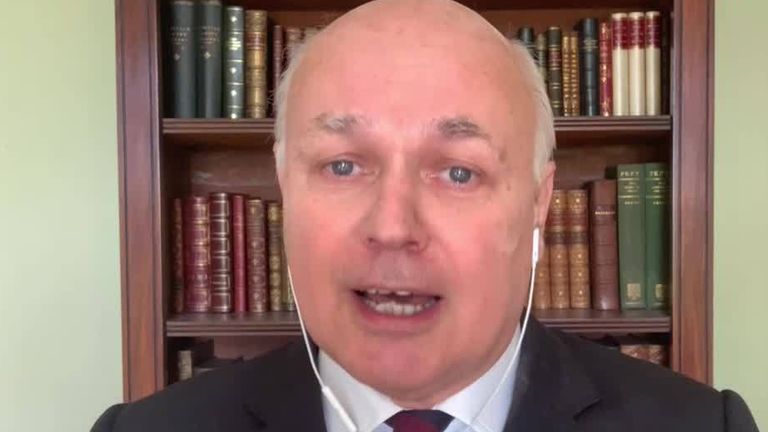Coronavirus: Nervy mood at centre of government as media attacks pile up
A long rebuttal of alleged COVID-19 failures shows ministers think they're the victims of hatchet jobs, says Sky's Tamara Cohen.
Monday 20 April 2020 12:23, UK
Governments in a crisis often face media coverage they believe is unfair or hostile.
If they think they have a strong case, a minister may be fielded onto the airwaves to defend a policy; or officials may hit the phones to offer counter-briefings to put their side forward.
What political journalists haven't seen before - I've covered politics for eight years, but colleagues who have done so for 20 years say the same - is a 2,100-word detailed rebuttal of a newspaper article of the sort produced last night.
Published on the government website, and duly tweeted out by departments and Conservative MPs, is a blistering response to the highly critical investigation by the Sunday Times into the "lost" first five weeks of the coronavirus crisis.
In it, a government spokesman attacks "a series of falsehoods and errors" which they say "actively misrepresents the enormous amount of work which was going on in government at the earliest stages" and describing some of the claims as "sloppy and unscientific".
Several officials are understood to have been involved in drafting it, one insider telling me the government could not allow "falsehoods like that to go unanswered".
It is the second one of these rebuttals within just two days, after 2,900 words were issued on Saturday in response to a Financial Times article describing procurement of ventilators based on "muddled thinking and political egotism".
The article was not even on the newspaper's front page, and the rebuttal did not just respond to the article itself, but what the government claimed were "inaccurate claims and assertions" in an accompanying Twitter thread by the journalist.
It's a far cry from Donald Trump's tweets about the fake news media, but seems to betray a nervy mood at the centre, against what those inside government see as hatchet jobs by sections of the media.
The government response to the Sunday Times article does not resolve the truth or otherwise of some of the claims the journalists make, including that the scientific establishment treated COVID-19 as a flu pandemic - hence the early discussion of "herd immunity" - until modelling based on death rates in Italy swung the balance towards a lockdown.
Much of the anger is focused at the accusation that the prime minister personally was guilty of dereliction of duty by missing five Cobra meetings in the early stages of the crisis.
This is a fact which was known weeks ago; but the article quotes an "adviser to Downing Street" - which the government's rebuttal makes clear is not the same as a Downing Street special adviser - saying his absence was unusual, and putting it down to the prime minister enjoying a break in the countryside.
The government's response on this point is a furious denial and references the fact that Labour's Alan Johnson chaired Cobra as health secretary during the bird flu pandemic in 2009 which was feared could be deadly in the UK.
Is this a new strategy? Number 10 under Boris Johnson had its early run-ins with the media, with senior political journalists boycotting a briefing in early February because not all colleagues were invited to attend.
Mr Johnson's early media appearances on traditional outlets were relatively infrequent.
But the coronavirus crisis - with daily televised press conferences in which journalists from a wide range of outlets question and scrutinise cabinet ministers - has changed all that.
Officials and ministers know the stakes could not be higher - thrust into an economy-destroying pandemic they could never have predicted just weeks after an election victory based on delivering Brexit and levelling up the country.
Boris Johnson, still convalescing from the virus, is enjoying high public approval ratings and the lockdown is widely supported in polls as a necessary measure.
Nonetheless, the mood can turn quickly, and those at the top of government are painfully aware that their handling of this crisis - no doubt to be picked over in future inquiries - is likely to define his premiership.
Early comments from ministers and scientists are already being picked over. There is a clear reason to get their version of history out straightaway.








